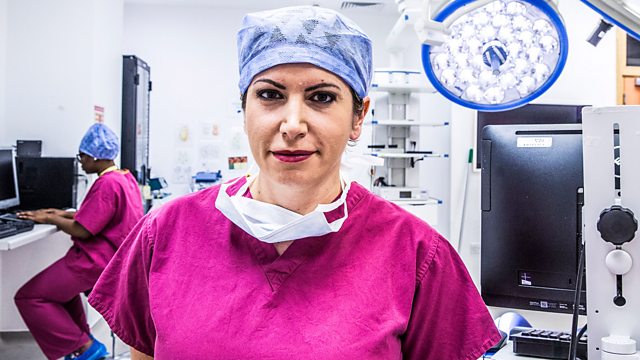
A teenager self-funds cutting-edge surgery for his cerebral palsy. Surgeons go to appeal to fund an 81-year-old’s surgery and use new DNA tumour profiling to try to save a baby.
Now in its fourth series, the award-winning Hospital charts, for the first time, the day-to-day life of six NHS Trusts across an entire city – Liverpool - whose hospitals have a catchment area covering more than two and half million people, stretching beyond the city to North Wales, Cheshire and the Isle of Man.
Filmed between October and December 2018, Hospital is the story of the health service in unprecedented times.
Edited and broadcast within weeks of filming, this six-part series for ����ý Two once again captures the day-to-day realities facing the NHS right now. With the government’s ten-year plan for the NHS recently announced, Hospital brings audiences close to the issues and challenges that continually dominate the headlines.
Fifteen-year-old Thomas is doing his GCSEs but suffers from cerebral palsy, a neurological condition caused when the part of the brain that controls movement is damaged, often during pregnancy or childbirth. Alder Hey Children’s Hospital is one of only five centres in the country to offer a spinal operation called Selective Dorsal Rhizotomy (SDR), which eases the uncontrollable tightening of the muscles caused by cerebral palsy. It’s only been available on the NHS for eight years.
Thomas was diagnosed when he was nine months old. He hasn’t been able to stand since he was eleven. He wakes four to five times a night cramped up in pain and struggles to feed himself. But Thomas doesn’t qualify for the SDR procedure; the NHS only funds the operation for children between the ages of three and nine and with some ability to walk. Research has shown that the operation is most beneficial to younger children. Alder Hey's lead SDR surgeon is gathering data to show that the benefits are significant to older patients as well. But such is his pain that Thomas is determined to have the operation and has raised £29,000 for the procedure and intensive physiotherapy afterwards. It could improve his speech, his mobility, his eating and ease his pain.
Abigail was born prematurely. She is now nine and about to undergo SDR. The surgeon at Alder Hey has pushed hard to get funding for Abigail before she turns ten. Her legs are very stiff and she is currently confined to a wheelchair, but she has the potential to walk unaided again. When Abigail undergoes surgery, her surgeon finds the spinal nerves she needs to single out and cut to relax the muscles are all tightly packed together. If the wrong nerve is cut then the consequences are paralysis and problems with bodily functions. The procedure is irreversible.
At Liverpool Heart and Chest Hospital, the first 'outstanding' rated specialist Trust in the country, 81-year-old Joan is on the waiting list for a TAVI (Transcatheter Aortic Valve Implantation) keyhole procedure to replace a failing heart valve. Twelve years ago Joan had open heart surgery for the same condition but now she’s too old to withstand the same, cheaper but much more invasive surgery. For elderly people, like Joan, TAVI, is their last chance. Patients, once diagnosed, have only two years to live if the failing heart valve isn’t replaced. Liverpool’s hospitals’ catchment areas extend across North Wales, where Joan lives. But the funding criteria for patients living in Wales and England are different. When the surgeons at the Heart and Chest are notified that the Welsh funding panel has turned down their application for Joan’s TAVI operation, they are determined to appeal. In England, they believe, the surgery would already have happened on their clinical recommendation.
Jaxon is almost one but he has been at Alder Hey Children’s on and off for almost half his life. He has a slow-growing but very large tumour in his pelvic area, engulfing the major blood vessels supplying his legs and compressing his abdominal organs; as a result he has problems tolerating feeds. The tumour is resistant to chemotherapy, but surgery to remove it is very risky and could result in the loss of one of his legs because of major blood vessel damage. The Alder Hey oncology team turns to cutting-edge genetic research that is yet to become routinely available. If pathologists can find information about the make-up of the tumour from its DNA then they may be able to find drugs to treat Jaxon’s cancer. So far, only a few cases in the country have been treated this way.
Shown from multiple perspectives, audiences witness the complexities of the dilemmas and decision-making which happen every day for consultants, surgeons and managers - and the impact these decisions have on patients.
Against the backdrop of historic demands stemming from limited resources, increasing patient numbers and social care at full stretch, the series shows the extraordinary work of some of Liverpool’s 20,000 NHS hospital staff as they push the boundaries of what is possible with world-class, cutting-edge treatments and life-saving operations.
Hospital is a co-production with the Open University.
Last on
Credits
| Role | Contributor |
|---|---|
| Executive Producer | Lorraine Charker-Phillips |
| Executive Producer | Simon Dickson |
| Executive Producer | Jackie Waldock |
| Series Editor | Sunshine Jackson |
| Series Producer | Meghan Just-Truelove |
| Series Producer | Gayl Paterson |
| Production Company | Label 1 |
Explore extensive resources and information on healthcare and nursing with The Open University
Visit the Open University website.
